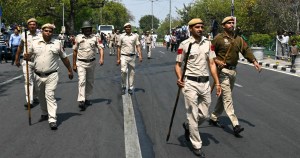
ZERO FIRS, ONLINE COMPLAINTS, ELECTRONIC SUMMONSES: KEY HIGHLIGHTS OF NEW CRIMINAL LAWS
Three new criminal laws—Bharatiya Nyaya Sanhita, Bharatiya Nagarik Suraksha Sanhita, and the Bharatiya Sakshya Adhiniyam—came into effect across the country on Monday, July 1.
The three laws have replaced the British-era Indian Penal Code, Code of Criminal Procedure and the Indian Evidence Act. From now on, all FIRs will be filed under the provisions of the new law. However, cases registered before July 1 will continue to be tried under the Indian Penal Code (IPC), Code of Criminal Procedure (CrPC) and Indian Evidence Act until their final disposal.
The new criminal laws will bring in a modern justice system, incorporating provisions such as Zero FIR, online registration of police complaints, summonses through electronic modes such as SMS and mandatory videography of crime scenes for all heinous crimes.
Also Read: New criminal laws come into effect as colonial-era IPC, CrPC get replaced
Key highlights of new criminal laws:
(1) Reporting incidents online: Under the new criminal laws, an individual can report incidents through electronic means of communication without having to go to the police station. This will make reporting easy and quick, thereby facilitating prompt action by the police. (Section 173 of Bharatiya Nyaya Sanhita (BNS))
(2) Zero FIR: With the introduction of Zero FIR, any person can lodge an FIR at any police station, irrespective of jurisdiction. This will eliminate delays in initiating legal proceedings and ensure prompt reporting of crime. (Section 173 of BNS)
(3) Free copy of FIR: Victims will receive a free copy of the FIR, thereby ensuring their participation in the legal process. (Section 173 of BNS)
(4) Right to be informed on arrest: In case of arrest, a person has the right to inform about his/her status to any person of his/her choice. This will ensure immediate help and assistance to the arrested person. (Section 36 of BNS)
Also Read: First FIR under new criminal law filed against Delhi street vendor
(5) Display of arrest information: Arrest details will now be prominently displayed at police stations and district headquarters, making it easier for family and friends of the arrested person to access important information. (Section 37 of BNS)
(6) Forensic evidence collection and videography: To strengthen the case and investigation, it has become mandatory for forensic experts to visit the site of serious crimes and collect evidence. Additionally, the process of evidence collection at the crime scene will be mandatorily videographed to prevent tampering with evidence.
(7) Speedy investigation: The new laws prioritise the investigation of crimes against women and children, ensuring that investigations are completed within two months of the filing of the complaint. (Section 193 of the BNS)
(8) Progress updates to victims: Victims have the right to receive regular updates on the progress of their cases within 90 days. This provision will keep victims informed and engaged in the legal process, thereby enhancing transparency and trust. (Section 193 of the BNS)
(9) Free medical treatment for victims: The new laws guarantee free first aid or medical treatment to victims of crimes against women and children in all hospitals. This provision ensures immediate access to necessary medical care, prioritising the well-being and recovery of victims in challenging times. (Section 397 of the BNS)
(10) Electronic summons: Summons can now be served electronically, through SMS, thereby expediting legal processes, reducing paperwork and ensuring proper communication between all concerned parties. (Sections 64, 70, 71 of BNS)
(11) Statement before female magistrate: Statement of victim in certain crimes against women should, as far as possible, be recorded by a female magistrate and if a female magistrate is absent, by a male magistrate in the presence of a female magistrate to ensure sensitivity and fairness and to create a conducive environment for victims. (Section 183 of BNS)
(12) Provision of police report and other documents: Both the accused and the victim have the right to receive copies of FIR, police report/charge sheet, statements, confessions and other documents within 14 days. (Section 230 of BNS)
(13) Limited adjournments: In order to speed up the trials, courts may grant a maximum of two adjournments to avoid unnecessary delay in the hearing of the case, which will help in ensuring timely justice. (Section 346 of BNS)
(14) Witness protection scheme: The new laws make it mandatory for all state governments to have a witness protection scheme to ensure the safety and cooperation of witnesses, and enhance the credibility and effectiveness of legal proceedings. (Section 398 of BNS)
(15) Gender inclusion: The definition of “gender” now includes transgender persons, which will promote inclusion and equality. (Section 2(10) of BNS)
(16) Exemption from visiting police station: Women, persons below 15 years of age, persons above 60 years of age and persons with disabilities or seriously ill persons are exempted from visiting police station and can seek police assistance at their place of residence. (Section 179 of BNS)
(17) Crimes against women and children: A new chapter has been added in BNS to deal with crimes against women and children and to ensure their protection and justice. (Chapter V of BNS)
(18) Community service: The new law introduces community service for minor crimes, which promotes personal development and social responsibility of an individual. Under community service, offenders get a chance to make a positive contribution to society, learn from their mistakes and build strong community bonds. (Sections 4, 202, 209, 226, 303, 355, 356 of BNS)
(19) Gender-neutral crimes: Various crimes against women and children have been made gender-neutral in BNS, covering all victims and offenders irrespective of gender.
(20) All proceedings in electronic mode: The new laws facilitate victims, witnesses and accused by conducting all legal proceedings electronically, thereby streamlining and expediting the entire legal process. (Section 530 of BNS)
2024-07-01T11:35:16Z dg43tfdfdgfd